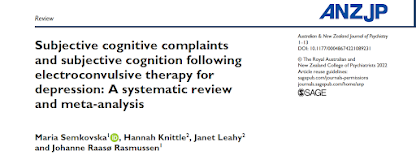Subjective Cognition After ECT: New Systematic Review and Meta-Analysis
Out on PubMed, from investigators in Denmark and Ireland, is this paper:
Subjective cognitive complaints and subjective cognition following electroconvulsive therapy for depression: A systematic review and meta-analysis.
Background: Subjective cognitive complaints represent a leading reason for suboptimal prescription of electroconvulsive therapy, the most acutely effective treatment for depression. However, research findings regarding their presentation are conflicting.
Objective: To describe, quantify and explain the variability in subjective cognitive complaints and subjective cognition following electroconvulsive therapy for depression.
Methods: We searched systematically PubMed, Embase, PsycARTICLES, CINAHL and relevant reviews for research published from 1 January 1972 to 31 August 2020. We included all independent studies of patients whose subjective cognition was assessed following brief-pulse electroconvulsive therapy for depression. Three meta-analyses were conducted to quantify: (1) the prevalence of patients presenting with cognitive complaints following electroconvulsive therapy; (2) the pre-post electroconvulsive therapy change in subjective cognition and (3) the association between change in depressive symptoms and change in cognitive complaints. Effect sizes were calculated using random-effects models. Eight prespecified demographic and clinical moderators of between-study variability were assessed using sub-group analyses and meta-regressions.
Results: Data from 72 studies including 5699 participants were meta-analysed. Weighted mean prevalence of patients with cognitive complaints was 48.1% (95% confidence interval = [42.3%, 53.9%]). The type of subjective measure used significantly impacted the pre-post electroconvulsive therapy change in subjective cognition, showing, respectively, large improvement (g = 0.81; 95% confidence interval = [0.59, 1.03]) after electroconvulsive therapy with the Squire Self-Rating Scale of Memory and small worsening (g = -0.48; 95% confidence interval = [-0.70, -0.26]) with 1-item memory scales. The strongest predictors of improved post-electroconvulsive therapy subjective cognition were increased age and larger post-electroconvulsive therapy decrease in depressive symptoms. The weighted mean correlation between pre-post electroconvulsive therapy decrease in depressive symptoms and pre-post electroconvulsive therapy decrease in cognitive complaints was 0.46 (95% confidence interval = [0.39, 0.53]).
Conclusion: Variability in subjective cognition following electroconvulsive therapy is mostly explained by the degree of post-treatment persisting depression and by the subjective assessment used. Scales measuring exclusively subjective worsening present limited clinical utility and instruments allowing the detection of both improvement and worsening in subjective cognition should be preferred.
Keywords: Subjective cognitive complaints; electroconvulsive therapy; major depression; meta-analysis; subjective memory; systematic review.
The article is here.
And from the text:


This is an important, methodologically complex study with fairly straightforward results. The association of better mood with report of better subjective memory is expected, as are worse subjective memory with BL electrode placement and greater number of treatments. The finding of older patients reporting fewer cognitive complaints is interesting.
The results are reported in a "glass half empty" manner, but the converse, that fewer than half of patients report subjective memory worsening, is also a valid perspective. Overall, it is useful to keep in mind that efficacy for life-disrupting and life-threatening psychiatric illness is the raison-d'etre for ECT and that tolerability concerns, while important, should not unduly compromise its appropriate prescription.







Comments
Post a Comment